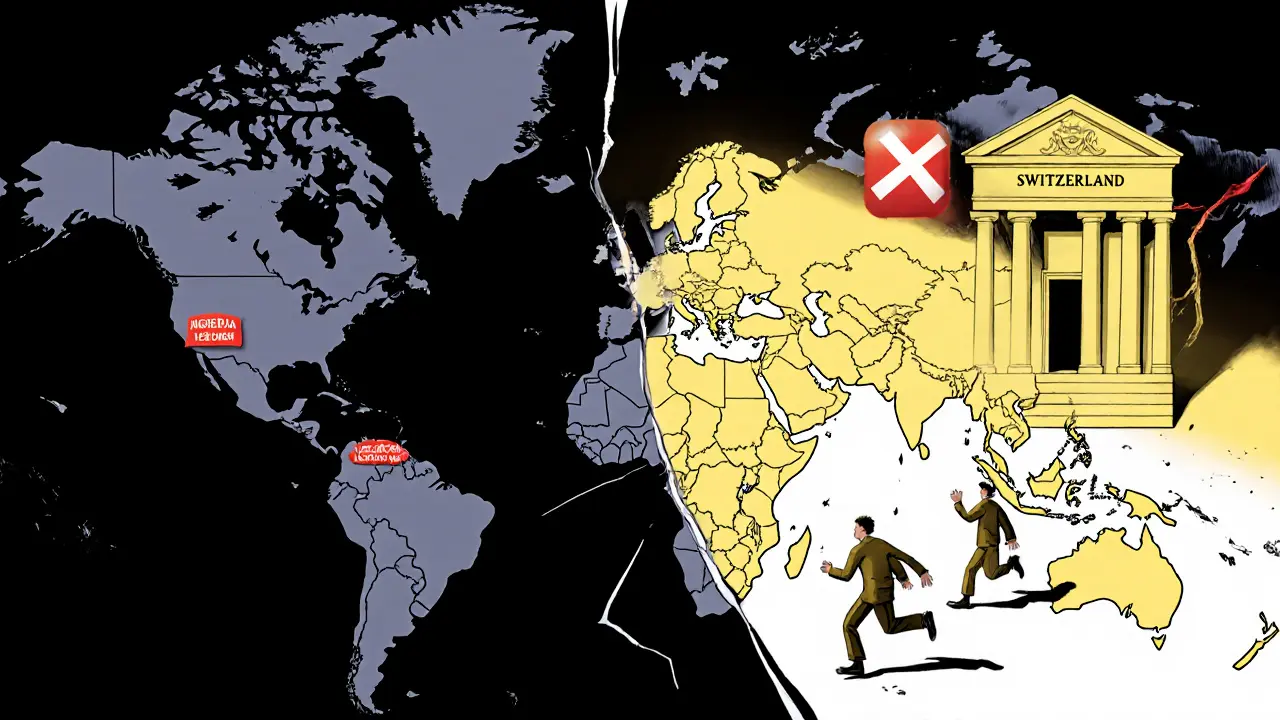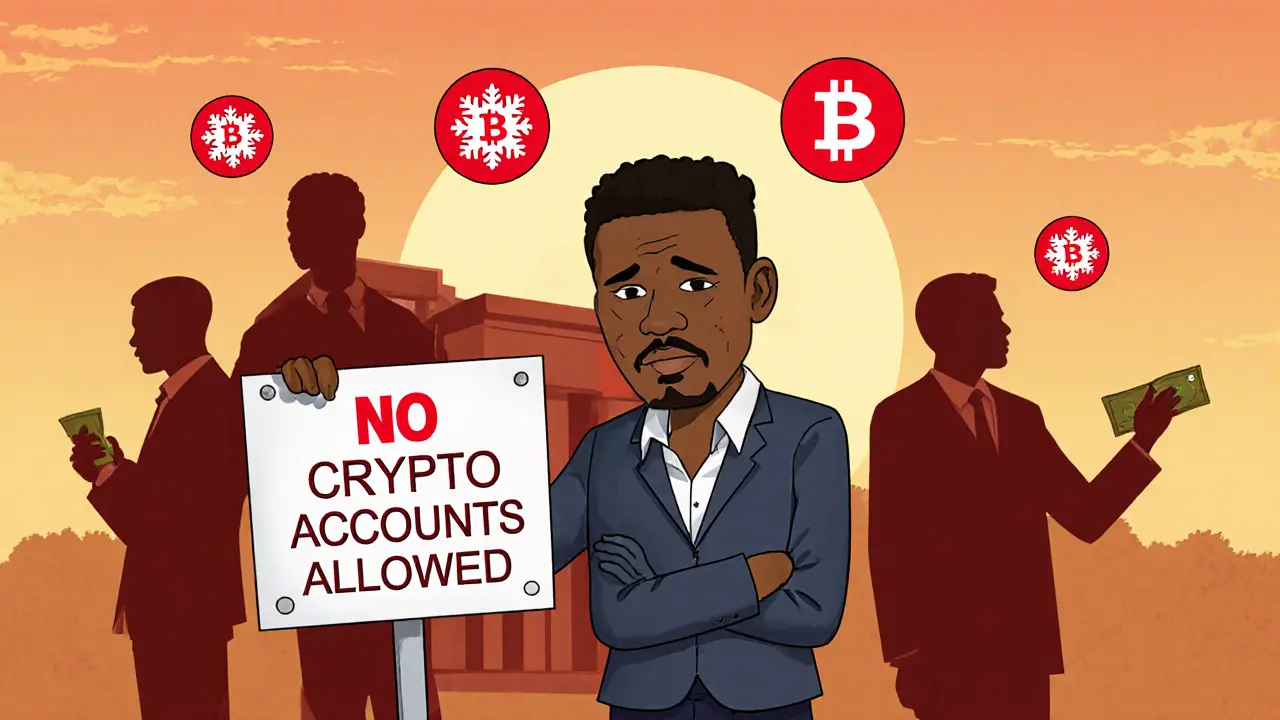Imagine having a thriving crypto trading business, making smart moves on Bitcoin and Ethereum, and then suddenly-your bank account gets shut down. No warning. No explanation. Just frozen funds and no way to cash out. This isn’t a rare glitch. It’s the daily reality for millions of crypto traders around the world. The problem isn’t crypto itself. It’s whether your country lets banks even talk to you if you trade digital assets.
Why Banking Access Matters More Than You Think
Crypto trading isn’t just about buying and selling tokens. It’s about turning those tokens into real money you can use to pay rent, buy groceries, or invest in your next trade. That’s where banking access comes in. Without it, you’re stuck using peer-to-peer (P2P) platforms, paying 15-20% premiums just to get cash, or relying on risky offshore wallets that can vanish overnight.According to Chainalysis’ 2025 Global Crypto Adoption Index, countries with clear banking rules for crypto traders see 3.2 times more trading volume than those that block it. That’s not a coincidence. Banks are the bridge between digital assets and the real economy. No bridge? No liquidity. No liquidity? No market.
Where Crypto Traders Are Blocked: The Hardline Countries
Some countries don’t just make banking hard-they make it illegal.Nigeria has had a full banking ban on crypto since 2017. The Central Bank of Nigeria (CBN) tells all banks: don’t touch crypto accounts. If you do, you face fines or even criminal charges. Over 20 million Nigerians trade crypto anyway, but they’re forced into P2P markets. One trader on Reddit, ‘NaijaCryptoKing,’ said he tried 11 banks. All closed his account within weeks of detecting Binance transfers. Now he pays extra just to get his money out.
Tanzania doesn’t outright ban crypto, but the Bank of Tanzania says the shilling is the only legal tender-and banks shouldn’t help with crypto. That’s a soft ban. No official punishment, but no support either. Banks ignore crypto traders. No business accounts. No wire transfers. No stablecoin conversions.
Algeria and Egypt follow similar patterns. Both have high crypto adoption, but zero banking support. A CryptoCompare survey in June 2025 found 89% of Algerian traders and 92% of Egyptian traders couldn’t open a bank account linked to crypto. They rely on cash exchanges, WhatsApp traders, and unregulated gateways. It works-but it’s dangerous.
Where It’s Possible: The Crypto-Friendly Hubs
Not all countries are hostile. Some have built clear, structured systems that let crypto businesses bank legally.Liechtenstein is the gold standard. Its 2020 Blockchain Act guarantees banking access for registered crypto firms. The Financial Market Authority (FMA) requires a $15,000-$25,000 registration fee, but once you’re approved, you get a bank account. 92% of licensed firms here have banking access. That’s higher than any other country. Traders report opening accounts in under two weeks. One founder told me he got a business account with a Liechtenstein bank while his German counterpart was still waiting six months.
Germany treats crypto as a financial instrument under BaFin. That means banks can legally hold crypto-related accounts. 68% of major German banks now offer custody services. Solaris Bank, a fintech partner of many crypto firms, has helped over 1,200 crypto businesses open accounts. The catch? You need a BaFin license, AML documentation, and a solid business plan. It takes 4-6 months. But once you’re in, you get full Euro access-no limits, no surprises.
Switzerland is another leader. FINMA gives clear guidance: if you’re licensed, you can bank. 87% of licensed crypto firms here have bank accounts. Swiss banks like Sygnum specialize in crypto. They offer multi-currency wallets, fiat on-ramps, and even crypto-backed loans. The downside? High compliance costs. Many small traders can’t afford the $20,000+ in legal fees to get licensed.
Australia requires Digital Currency Exchange (DCE) registration with ASIC, costing $5,000-$10,000. But it works. 76% of registered exchanges get banking access. The Australian Taxation Office (ATO) even provides clear tax guidance, which helps banks feel safe. Traders here report fewer account closures than anywhere else in Asia-Pacific.
Panama surprises many. No capital gains tax on crypto. A 2023 Digital Assets Law gives legal clarity. 81% of registered crypto firms here have bank accounts. That’s better than El Salvador, where Bitcoin is legal tender but banks still won’t touch most crypto businesses. Panama’s secret? Simplicity. No complex licensing. Just registration and basic AML checks.

The Coming Change: What BCBS Rules Will Do in 2026
A major shift is coming. The Basel Committee on Banking Supervision (BCBS) released new rules in July 2024, requiring banks to hold 1,250% in capital reserves for unbacked cryptoassets. That means if a bank holds $1 million in Bitcoin, it must keep $12.5 million in reserves. No bank can afford that.Most banks will just say no to crypto. That’s what Dr. Agustin Carstens of the BIS warned in March 2025: “The BCBS framework will likely restrict banking access for unbacked cryptoassets.”
But not all countries will follow strictly. Switzerland’s FINMA is allowing 800% risk-weighting for tokenized assets. The UAE’s FSRA uses 800-1,000%. That’s still tough, but it leaves the door open. Countries that adopt these flexible versions will keep their crypto banking ecosystems alive. Others? They’ll be cut off.
Dr. Philipp Sandner of the Frankfurt School Blockchain Center says 78% of current crypto participants could lose banking access after 2026. That means millions of small traders, hobbyists, and startups will be pushed into the shadows.
What You Need to Get a Bank Account (If You Can)
If you’re trying to open a crypto-friendly bank account, here’s what you’ll need:- Proof of regulatory license (e.g., Malta’s VFA license, Australia’s DCE registration)
- Full AML/CFT compliance documentation (KYC for all owners, transaction monitoring logs)
- Business plan showing how you’ll use the account (not just “buying Bitcoin”)
- Proof of legal structure (company registration, articles of incorporation)
- Banking references from previous institutions (if you’ve had accounts before)
Most rejections happen because of poor documentation. The Atlantic Council found 47% of applications fail due to weak AML papers. Another 29% get rejected because the business description doesn’t match the bank’s risk profile. Saying “I trade crypto” isn’t enough. You need to say “I operate a licensed DCE offering fiat-to-BTC on-ramps for verified users in the EU.”
Expect to pay $15,000-$30,000 in legal fees if you’re not familiar with compliance. Many traders hire firms in Malta, Switzerland, or Georgia to handle the paperwork. It’s expensive-but cheaper than losing your funds to a frozen account.

Who’s Winning and Who’s Losing
The data doesn’t lie. The top 10 crypto-banking-friendly countries account for 4.7 times more on-chain trading volume than the bottom 10. That’s $2.3 trillion vs. $490 billion in 2025.Traditional banks are stepping in. Solaris Bank in Germany, Sygnum in Switzerland, and even Revolut now offer crypto services. But they only work with licensed entities. The unregulated? They’re left behind.
Enterprise adoption is rising fast. 73 Fortune 500 companies now use crypto banking for treasury management and cross-border payments. They’re not using P2P. They’re using regulated banks. That’s the future.
By 2027, the World Economic Forum predicts the global crypto market will split into two: crypto-ready countries and restricted ones. The divide won’t be about technology. It’ll be about banking access.
What Should You Do?
If you’re a crypto trader:- If you’re in Nigeria, Egypt, or Algeria: accept that banking access is unlikely. Use regulated P2P platforms. Avoid large transfers. Keep records.
- If you’re in the U.S., Canada, or EU: start the licensing process now. BaFin, ASIC, or FINMA licenses aren’t optional if you want long-term access.
- If you’re in Panama, Malta, or Liechtenstein: you’re in the best position. Get licensed. Open the account. Build your business.
- If you’re anywhere else: check your country’s regulator website. Look for terms like “virtual asset service provider,” “digital asset license,” or “crypto regulation.” If it’s not there, banking access won’t come soon.
Don’t wait until your account is frozen. The clock is ticking. The 2026 BCBS rules will lock in the winners and losers. If you want to bank with crypto, you need to be on the right side of the law-and the right side of the bank’s risk policy.
